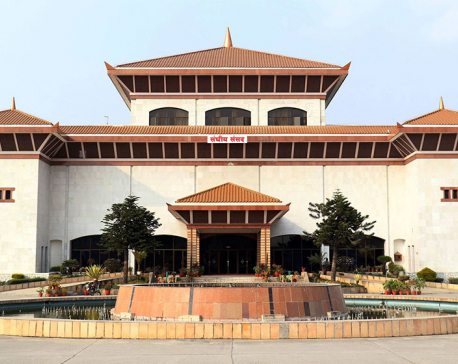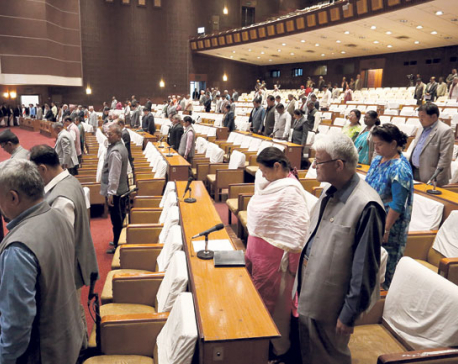
OR
8 economic bills passed by parliament in less than 4 months
Published On: October 4, 2016 08:58 AM NPT By: Republica | @RepublicaNepal
KATHMANDU, Oct 3: As many as eight bills related to the economic sector have made it through the parliament in recent months and a few more are in their last legs of discussion in the parliaments’ committees. These moves have been widely hailed by the private sector.
Acceleration in the speed of approval of much-awaited bills is expected to boost economic growth and also address binding constraints in investments.
The latest bill approved by the parliament was an amendment to the Industrial Enterprise Act on Thursday and private sector has hailed the bill saying it had assured policy consistency as well as provided a favorable environment to the country’s manufacturing sector.
Bills for amendment to the Nepal Rastra Bank Act, the Public Procurement Act, the Employees Provident Fund Act, the Audit Act, and the Banking Offence and Punishment Act have already received parliament clearance while new bills -- the Special Economic Zone Act and the Bill on Establishment and Operation of Deposit and Credit Guarantee Corporation -- have been endorsed by the parliament.
Most of amended bills were first endorsed in the early 1990s after the country embraced a liberal economic policy and a free-market economy. But they had not been updated since then, and the country’s economic sector suffered as a result, in addition to the 10 years of insurgency plus political instability after 2006.
The private sector and experts have been lobbying for reforms to those laws to unlock binding constraints.
Commenting on Sunday about the newly-approved bills, Federation of Nepalese Chambers of Commerce and Industry Senior Vice-President Bhawani Rana said the sector appreciated the government’s priorities on endorsing bills which have been pending for years. The Private sector especially appreciated the ‘no work, no pay’ provision in the law, she said.
Confederation of Nepalese Industries President Hari Bhakta Sharma is also hopeful of an environment for investment arising from the new laws as they assure investors of returns through policy consistency.
“These reforms may not bring immediate results but they send a message to investors that Nepal’s parliament is committed to reforms to encourage investment and economic development,” Sharma said. “The house should also focus on other important laws -- like amendment to the Labor Act, the Foreign Investment and Technology Transfer Act, and the Intellectual property Rights Act, among others.”
Industrialists and investors have demanded that the parliament and the government also address the chronic energy crisis and infrastructure constraints for an investment climate in the country.
Pointing to labor problems as a major issue in Nepal’s industrial sector, Sharma suggested embracing a policy of human resource development through legal reforms rather than defining the employer and labor relations in a traditional approach.
Former finance minister Ram Sharan Mahat had announced legal reforms three years ago which he called the ‘second tier of reforms’ after 1990s but the measures did not move ahead until the current parliament session began in May.
Economist Bishwambher Pyakuryal however has reservations about the way bills are getting through without a comprehensive deliberation on the issues.
“The important laws have made it through the parliament without proper debate and discussions, and this may not be owned by even those industrialists while implementing as they also do not know its implications,” Pyakuryal said.
Pyakuryal said intellectuals had to struggle to bring back the Banking and Financial Institution Act into the parliament’s committee for fresh discussion after reports of conflict of interests of a few lawmakers -- who were also directors in BFIs -- who had decided their terms as boards of directors.
Pyakuryal also cautioned that lack of proper and needful debates and discussions may create hurdles while implementing the laws.
The government plans to amend over two dozen other laws related to the economic sector but several of them are still in their draft stages.
You May Like This

Three bills passed
KATHMANDU, Aug 11: Three different bills-- Police Adjustment Bill-2076, Bill related to Work Execution, Supervision and Coordination of to Nepal... Read More...

Poll bills clear parliament after amendment dropped
KATHMANDU, September 5: Paving the way for the upcoming elections to the federal parliament and provincial assemblies, parliament on Monday passed... Read More...

10 ministries spend less than 10 percent capital budget
KATHMANDU, Jan 31: Government agencies are losing their institutional capacity to expedite capital spending. ... Read More...







Just In
- NRB to provide collateral-free loans to foreign employment seekers
- NEB to publish Grade 12 results next week
- Body handover begins; Relatives remain dissatisfied with insurance, compensation amount
- NC defers its plan to join Koshi govt
- NRB to review microfinance loan interest rate
- 134 dead in floods and landslides since onset of monsoon this year
- Mahakali Irrigation Project sees only 22 percent physical progress in 18 years
- Singapore now holds world's most powerful passport; Nepal stays at 98th











Leave A Comment